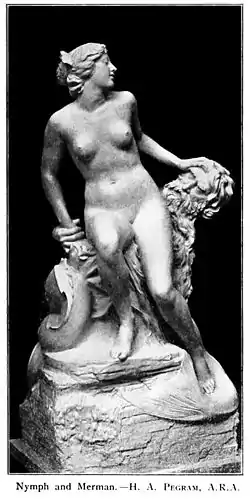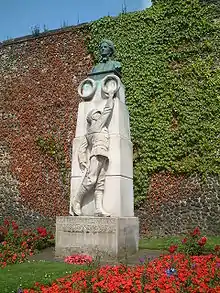Henry Alfred Pegram
Henry Alfred Pegram RA (27 July 1862 – 26 March 1937) was a British sculptor and exponent of the New Sculpture movement.[1]


Life
Pegram was born in London and received his first artistic education at the West London School of Art. Already in 1881 and in 1883 he won prizes at the National Art Competitions. In 1881, he entered the Royal Academy schools, where he again won prizes in 1882, 1884, and 1886. In 1887 he left the school and worked until 1891 as assistant to Hamo Thornycroft. He became a member of the Art Workers' Guild in 1890, an Associate of the Royal Academy in 1904 and finally a Royal Academician in 1922. From 1890, Pegram was commissioned for numerous building decorations and statues. In 1913, he was one of the ten sculptors selected to work on the city hall of Cardiff, for which he sculpted the figure of Llewelyn the Last.[2]
Pegram was a cousin to the Brocks of Cambridge, a family with four brothers who worked as painters and illustrators in a large studio at their family home in Cambridge. His eldest daughter, Doris Joan Pegram (12 June 1886 – 1 November 1979),[3][4] married one of the brothers, the artist and illustrator H. M. Brock RI (11 July 1875 – 21 July 1960)[5][6] on 7 September 1912.[7] The illustrator Fred Pegram RI (19 December 1870 – 23 August 1937),[8] and his brother, the sculptor and medallist Alfred Bertram Pegram[9] (17 January 1873 – 14 January 1941)[10][11] were first cousins to both Henry Alfred and the Brocks.
Henry Alfred Pegram died of a cerebral haemorrhage,[12] on 26 March 1937 in his home, 72 Belsize Park Gardens, Belsize Park, Hampstead, London.[13]
Prizes
- Bronze medal at the Paris International Exhibition of 1889 (for Death Liberating a Prisoner)[14]
- Gold medal at Dresden, 1897 (for The Last Song)[2]
- Silver medal at the Paris International Exhibition of 1900 (for a life-size plaster cast of Sibylla Fatidica, a marble version was presented in 1904 to the Tate.)[14]
Selected works

- Industry and Britannica, entrance of the Imperial Institute, London. (1891–1892)[15]
- Ignis Fatuus or Misleading Light (1889).[14]
- The Last Song (1897).[2]
- Bronze candelabra in St. Paul's, London (1897).[1]
- Sibylla Fatidica (1900–1904).[14]
- Monument to Ninon Michaelis at Kensal Green Cemetery (approx 1901).
- Reliefs at St Paul's Girls' School, Brook Green. (1903)[16]
- "The Bather" friezes at Buckingham Gate no. 20, Westminster, London (now the High Commission of Eswatini).[15]
- Statue of Thomas Browne in Norwich (1905).[2]
- Into the Silent Land (1905).[2] Gifted to Golders Green Crematorium by the Royal Society of Arts in 1937
- By the Waters of Babylon (1906).[2]
- Statue of Sir John Logan Campbell in Auckland (unveiled 24 May 1906).[1][17]
- Stone frieze at the Aston Webb building of the Birmingham University (1907).[18]
- Statue of Cecil Rhodes in Cape Town (1910).[1]
- Oriel College, Oxford, Rhodes Building, group of seven statues including Rhodes, Edward VII and George V (1911) [19]
- Nereus and Galatea (1911).[2]
- Chance (1913).[2]
- Figure of Llewelyn the Last at Cardiff City Hall.[2]
- Ophelia and the River Gods (1914).[2]
- Edith Cavell monument in Norwich (1917).[20]
- Victory on the War memorial at Cunard building, Liverpool.[15]
- Hylas (1922), installed in 1933 in the Rose garden, Regent's Park, London.[2]
- Preston Cenotaph in Market Square, Preston, Lancashire (1926).[15]
- Statue of Sir Robert Hart in Shanghai.[1]
References
- Chamot, M.; Farr, D.; Butlin, M.: The Modern British Paintings, Drawings and Sculpture, London 1964.
- Quinlan, M.: Henry Alfred Pegram Archived 2006-10-02 at the Wayback Machine. URL last accessed 2008-08-22.
- National Archives (1939-09-29). 1939 Register: Reference: RG 101/6305F E.D. TABC. Kew: National Archives.
- "Wills and Probates 1858 and 1996: Surname Brock and the year of death 1980". Retrieved 2020-07-13.
- Houfe, Simon (1978). "Brock, Henry Matthew R. I.". Dictionary of British Book Illustrators and Caricaturists, 1800-1914. Woodbridge: Antique Collectors' Club. p. 245. Retrieved 2020-07-12 – via The Internet Archive.
- "Wills and Probates 1858-1996: Pages for Brock and the year of death 1960". Find a Will Service. Archived from the original on 2020-06-07. Retrieved 2020-06-07.
- London Metropopolitan Archives (1912-09-07). "Marriage Solemnized at St. Paul's Church in the parish of Hampstead in the county of Middlesex: No. 128: Henry Matthew Brock and Doris Joan Pegram". London, England, Church of England Marriages and Banns, 1754-1932. London: London Metropolitan Archives. p. 64.
- Houfe, Simon (1978). "Pegram, Frederick R. I.". Dictionary of British Book Illustrators and Caricaturists, 1800-1914. Woodbridge: Antique Collectors' Club. p. 412. Retrieved 2020-07-12 – via The Internet Archive.
- "Alfred Bertram Pegram". Mapping the Practice and Profession of Sculpture in Britain and Ireland 1851-1951. Retrieved 2020-07-13 – via University of Glasgow History of Art and HATII.
- National Archives (1939-09-29). 1939 Register: Reference: RG 101/238A E.D. AKBI. Kew: National Archives.
- "Wills and Probates 1858 and 1996: Surname Pegram and the year of death 1941". Find a Will Service. Retrieved 2020-07-13.
- Sharp, Robert (2007-10-04). "Pegram, Henry Alfred (1862–1937)". Oxford Dictionary of National Biography. Retrieved 2020-07-12.
- "Wills and Probates 1858 and 1996: Surname Pegram and the year of death 1937". Find a Will Service. Retrieved 2020-07-12.
- Wengraf, P.: Henry Alfred Pegram. URL last accessed 2008-08-22.
- Lawson, G.: Pegram, Henry Alfred, version of 2008-08-13. URL last accessed 2008-08-22.
- Hammersmith and Fulham Historic Buildings Group: St Paul's Girls' School. URL last accessed 2008-08-22.
- Unveiling the Campbell Statue Hawera & Normanby Star, May 25, 1906. URL last accessed 2008-08-22.
- Royal Institute of Architects: Item RIBA20226. URL last accessed 2008-08-22.
- https://statues.vanderkrogt.net/object.php?webpage=ST&record=gbse145
- Cocke, R.; Cocke, S.: Public sculpture in central Norwich Archived 2008-07-24 at the Wayback Machine, The Norwich Society, 2007. URL last accessed 2008-08-22.